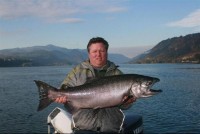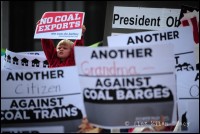Columbia Riverkeeper Legal & Program Director Lauren Goldberg Reflects on 20 Years of Victories
20 Years of Victories!

Brace yourself: It’s time to celebrate 20 years of amazing victories for clean water.
And for our climate, families, and souls. Together, thousands of people forged the path to victories. Each of you makes Columbia Riverkeeper a force for good in these challenging times.
Every victory started as an improbable question. Could we really prevent the United States from shipping even more radioactive waste to Hanford? Could we really stop a $6-billion liquefied natural gas terminal and hundreds of miles of gas pipelines? Could we really protect people who eat locally caught fish from a corporate polluter? The answer: a resounding yes.
“The heroes of Riverkeeper’s story are the thousands of volunteers and donors who have dedicated time and money to bend the future of the Columbia River away from toxic pollution and fossil fuels,” reflects Riverkeeper’s Conservation Director Dan Serres. “It’s been an honor to work with and support people from Astoria to the Upper Columbia who have taken on this challenge.”
Victories take many shapes: Court decisions. Creative community organizing to convince elected officials to do the right thing. New laws. Victories also look like lifelong friendships, forged through late nights at public hearings and rallies in the bitter cold.
Victories at a Glance
Take a bird’s-eye view of Riverkeeper’s string of victories and a theme emerges: Riverkeeper does not shy away from controversy. Here’s one example: Riverkeeper sued Sandvik, an international company with $82 billion in sales, after it discharged high levels of toxic metals, fluoride, and ammonia at its Kennewick, WA, facility into the Columbia River for years. Riverkeeper’s lawsuit forced Sandvik to stop illegal pollution by fixing its treatment system and pay a $650,000 mitigation penalty to three local non-profit organizations to protect clean water. Lawsuits stop pollution and send a powerful message to corporations: comply with the law or face stiff consequences.
“We take polluters to court when the government turns its back on illegal pollution. We advocate for stronger laws to reduce toxic pollution in fish and drinking water. And we push government agencies to take action for clean water and our climate,” notes Staff Attorney Erin Saylor, who joined Riverkeeper’s staff in 2019 after six years at the U.S. Environmental Protection Agency. Standing up to corporate polluters and suing the government is controversial in some circles—it’s in Riverkeeper’s DNA.
Riverkeeper is an essential companion, channeling the tiny streams of our individual energies into a powerful flood of advocacy and hope, uniting our voices and magnifying them with legal know-how and organizing power.
Why? Tackling controversial issues stops pollution, protects our climate, and advances environmental justice. If legal work is our compass to navigate harmful proposals, community organizing is our engine. Our work is powered by the brilliant and passionate local people who stand together to protect their communities. Together, we craft strategies, rely on local knowledge, earn media coverage, and turn out smart public testimony. The victories we reflect on in the following pages are a testament to the power of grassroots community organizing.

More than the Adrenaline Rush
Our work doesn’t end with a courtroom win or a successful campaign over an oil refinery or coal export proposal. We dig deeper. Our members want to get their hands dirty—and wet—for a good cause. And our members want to connect with one another.
Over the last two decades, Riverkeeper’s water quality monitoring program activated hundreds of volunteers to test water quality. In 2018 we launched a unique environmental restoration and education program in the Columbia River Gorge, the Nichols Natural Area Program, to reach thousands of diverse students through hands-on science.

From public forums to film screenings to a bilingual radio show and podcast, Riverkeeper feeds your thirst for knowledge and action, to protect a river we all love. “Conoce tu Columbia [Riverkeeper’s radio show and podcast] is a powerful tool for community organizing. We amplify voices in our community—to connect and take action to protect our families and the river,” explains Senior Organizer Ubaldo Hernández.
We reflect on memorable victories from the last two decades. You made these victories possible:
Victory! Salmon ♥ Wild Rivers, Cold Water
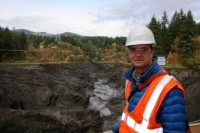
The White Salmon Runs Free
Not many campaigns end with a BANG. The Condit Dam on the White Salmon River blocked salmon for 100 years until a huge community effort—and a little dynamite—freed the river in 2011. Court Orders Action to Combat Hot Water Crisis Riverkeeper and allies sued the U.S. Environmental Protection Agency (EPA) under the Clean Water Act for ignoring the plight of endangered salmon in the face of rising river temperatures caused by dams and climate change. In 2019, the Ninth Circuit Court of Appeals ruled in our favor. Now, EPA must develop a pollution plan designed to protect salmon from hot water in the Columbia and Snake rivers.
Victory! Slashing Toxic Pollution
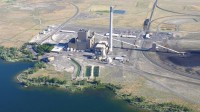
End to Coal-Fired Power Plant Pollution
Coal is one of the dirtiest and most dangerous ways to produce electricity. For decades, Portland General Electric (PGE) ducked, dodged, and lobbied its way out of the company’s legal obligation to limit hazardous air pollution at its Boardman, OR, coal-fired power plant. As part of a 2011 legal settlement with Riverkeeper and allies, PGE agreed to shut down Oregon’s only coal-fired power plant in 2020. Curbing Oil Pollution from Dams Riverkeeper sued and forced eight large dams to reduce toxic oil pollution—a win the New York Times called “historic” and the Wall Street Journal called “groundbreaking.” Since the 2014 victory, we secured similar results in lawsuits over oil pollution from Grand Coulee and Chief Joseph dams.
Victory! Laws for Clean Water
Clean Water Wins
In 2005, Oregon Department of Environmental Quality tried to weaken our water clarity standards at industry’s behest. Riverkeeper and allies turned to rallies and strong legal arguments to protect clean water.
Nation’s Best Toxic Pollution Limits
Toxic pollution threatens the health of people that eat local fish and jeopardizes the public’s right to eat fish caught locally. Riverkeeper worked closely with the Confederated Tribes of the Umatilla Indian Reservation, the Columbia River Inter-Tribal Fish Commission, and nonprofit Northwest Environmental Advocates to push Oregon to adopt the nation’s most protective limits on toxic water pollution in 2011.
Victories! Fossil Fuel Industry Shut Out
Coal! Fracked gas! Oil! Oh my!
Stunning proposals for massive fossil fuel terminals and pipelines took center stage over the last two decades. Riverkeeper worked with tribal nations, local businesses, strong coalitions, and our amazing members to defeat nearly every new fossil fuel project on the Columbia River. You helped stop each of these fossil fuel proposals. Our work remains: oil and fracked gas infrastructure, like the proposed NW Innovation Works methanol refinery in Kalama, WA, still threatens the Columbia.
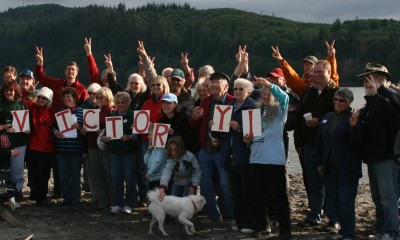
Peak export of 1.3 billion cubic feet of gas per day and 220 miles of pipeline.
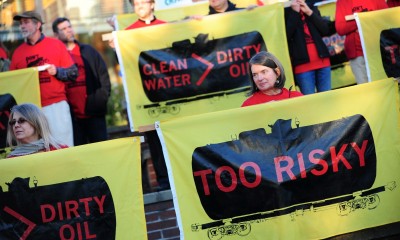
Thirty-six oil trains per week!
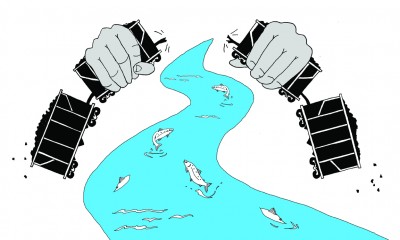
An 8-million-tons-per-year coal export terminal.
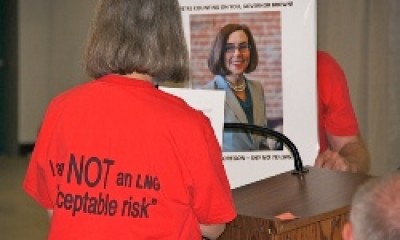
1.2 billion cubic feet of gas per day and over 200 miles of new pipeline.
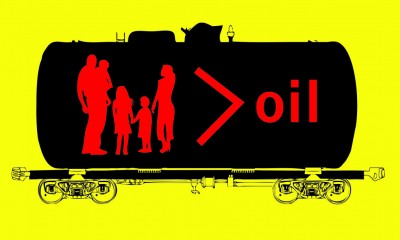
West Coast’s first oil refinery in 25 years—defeated.
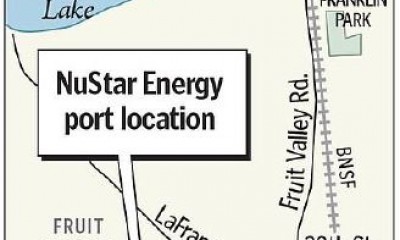
Twenty-two thousand barrels of crude oil per day.
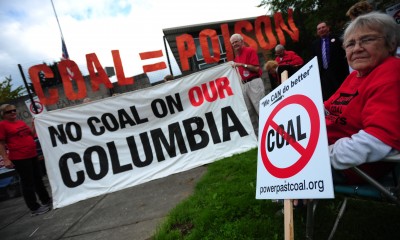
North America’s largest coal export terminal (62 coal trains per week).
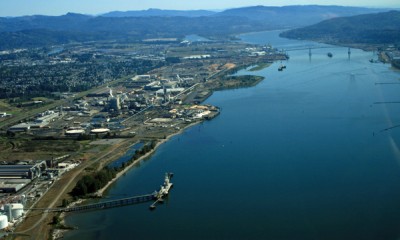
Rejected by the Port of Longview, citing public concerns about health and safety.
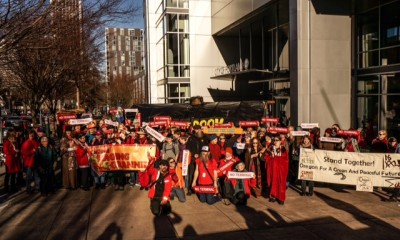
Seventy-two thousand barrel per day propane export terminal.
Victory! Open Government
Backroom Deals? Not on Our Watch
In 2013, Port of Vancouver commissioners met in secret with representatives of Tesoro to pave the way for Tesoro’s proposal to build the nation’s largest oil-by-rail terminal. Problem: The meetings were illegal under the state’s open meetings law. The Washington Supreme Court ruled in favor of Riverkeeper and allies, setting important precedent for government transparency.
Government Documents Expose Dirty Coal Plans
When the federal government refused to study the full environmental impact of the Morrow Pacific Coal Export proposal, Riverkeeper filed a Freedom of Information Act request to find out why. Turns out, top brass in the U.S. Army Corps of Engineers had decided to cut short the review process to smooth the way for this dirty coal export project. Shortly after Riverkeeper made this information public, the coal company folded.
Celebrate Columbia Riverkeeper’s 20th Anniversary fighting for clean water and a healthy climate: Make a gift, renew your membership, or become a member.
In this Issue: It’s time to celebrate 20 years of amazing victories for clean water. Each of you makes Columbia Riverkeeper a force for good in these challenging times.
